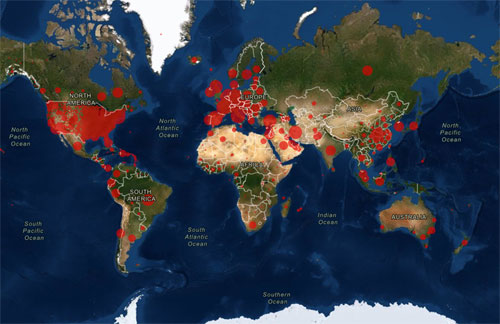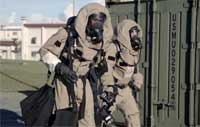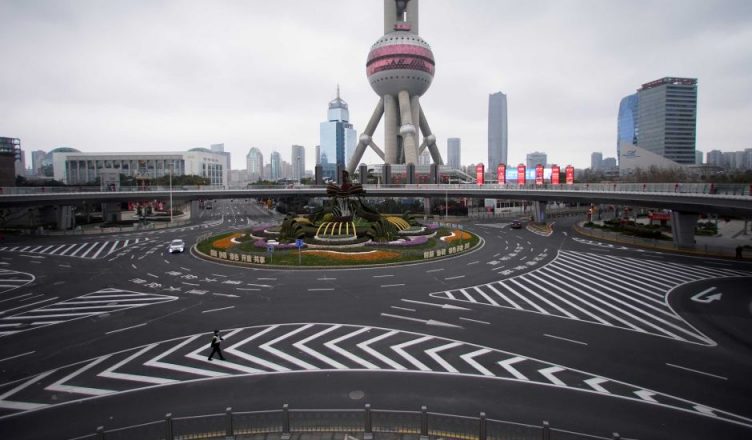The COVID-19 pandemic is wreaking havoc on health care systems and the global economy. The many unknowns of the virus make it hard for governments to implement effective measures and difficult for the medical industry to develop vaccines. From an economic standpoint the estimated costs for the global economy is in the staggering range of USD 3 Trillion (1T=1,000,000,000,000).

While the world has almost 2 million confirmed cases, the U.S., alone has more than 500,000 cases and 20,000 deaths, and has overtaken China with approx. 82,000 cases and 3,000 deaths. Half of all confirmed cases are now in Europe, with low- and middle-income countries a few weeks behind. See Worldometers.
Let’s have a look at my notes on scenarios for different sectors:
National and global markets

The COVID-19 pandemic is the event that defines “peak globalization” and the end of global markets as we know them. On the short-term the entire global economy will suffer from decreased demand and negative growth. Long-term consequences could be a more secure supply chain, more transparent and secure logistics. All over stricter criteria for citizenship. See COVID-19: Implications for business from McKinsey & Co.
Best case: Calibrated trade, increased local production and secured value chains.
Worst case: Global supply chain collapse resulting in lasting recession.
Public health
The demography would change with a death rate above 10 percent among people older than 80 years. Nursing homes would need to reorganize to avoid contamination. Medical shortages in the global supply chain will be replaced by locally produced medical equipment and drugs. National health services will increase resilience towards supply chain shocks. Health services will establish systems for virus tracking and use teleconference with dedicated hardware for testing. Health services could become less expensive. See Coronavirus pandemic could have caused 40 million deaths if left unchecked from Imperial College London.
Best case: Safe vaccine, optimized public and private health services.
Worst case: Breach of health care capacity due to persistent spread, mutations and no vaccine.
State finances and employment

Short-term mass unemployment will become a major burden for state finances in already poor countries. This is a black swan double-whammy with increased public spending and decreased tax revenue. Rich countries will spread the cost on future generations through different economic mechanisms. Most industries and government services will undergo a major shift towards automation, digitalization and re-organizing for remote work.
Best case: Realignment of business models and free education to handle future pandemics.
Worst case: Unrelieved mass unemployment, social unrest, riots and revolutions.
Public consumption
Consumers will go from hoarding toilet paper to planning for the next pandemic. There will be a major shift towards online shopping and home delivery of everything. Most brick and mortar shops will be redesigned to maintain low risk contamination spaces.
Best case: Due to realigned business models established companies grow and new arrive.
Worst case: Mass foreclosures results in a global quasi-monopoly with few suppliers
Technology and privacy
Short-term lower standards for privacy and increased use of teleconferencing in all sectors. Long-term increased trust in AI, surveillance, physical security and decontamination technology. Teleconferencing and advanced VR solutions will flourish while smart watches take blood samples and do real-time testing.
Best case: Better medtech and medical nanotech breakthrough.
Worst case: Mass surveillance and loss of privacy.
Military and cybersecurity

The deglobalizing effects on the economy will spill over into the geostrategic military space. NATO and other multi-national security organization will re-organize to combat the pandemic and potential terrorist exploits of the virus. Cybercriminals attack banks, companies and governments with malware claiming to be important information about the virus. Potential of disruptions lead to more civilian defense initiatives. See Military Mind and the Pandemic from International Centre for Defence and Security.
Best case: Reduced global conflict and virus induced peace deals.
Worst case: Terrorist spread of coronavirus.
Politics and ideology
The established political order will prevail and grow stronger by the pandemic. At the same time critique of liberal globalism will lead to increased support for national and totalitarian regimes.
Best case: Increased state resilience and civilian health discipline.
Worst case: Global totalitarian anti-virus regime.
For philosophical perspectives I highly recommend PlaguePod Live, especially Day 21.

